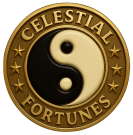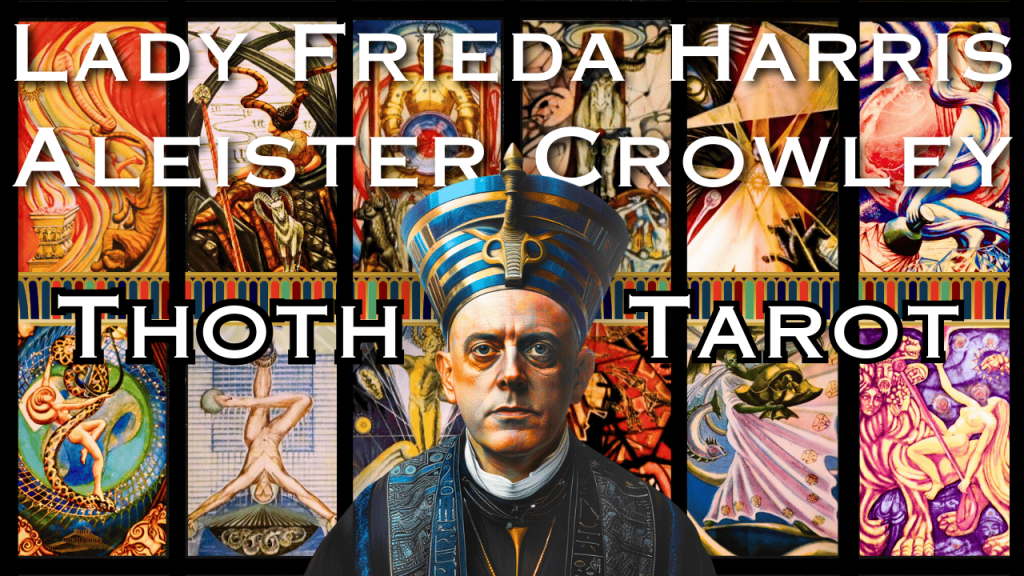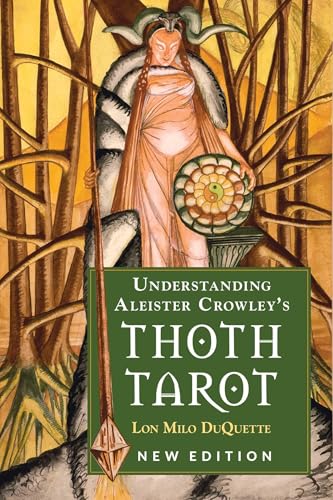Aleister Crowley was once called the wickedest man in the world. His deep exploration of the occult led him on a journey to create a tarot deck unlike any other. He joined forces with Lady Frieda Harris, an artist who was eager to break away from her strict upbringing, and together they created the Thoth Tarot Deck.
Their work blended rich symbolism with striking artwork, making the deck stand out in the world of tarot. The collaboration was not always smooth. There were moments of tension, controversy, and even legal battles, but what they created continues to fascinate people today.
Aleister Crowley: The Man Behind the Wickedest Reputation
From High Society to the Occult
Aleister Crowley grew up in a wealthy British family. He turned away from his Christian roots and chose a path that led him deep into the world of mystery and magic. Crowley joined the Hermetic Order of the Golden Dawn, a group that focused on practicing and understanding the occult.
His life mixed scandal, curiosity, and a drive for knowledge. Crowley was known for his bold choices, breaking away from tradition and searching for spiritual enlightenment wherever he went. He became famous for exploring the unknown and was often in the spotlight for his unique lifestyle.
Spiritual Pursuits and Thelema
Crowley’s journey took a huge turn after a mystical experience in Egypt during his honeymoon in 1904. He created his own spiritual philosophy, called Thelema. Its main idea was simple but daring: Do what thou wilt shall be the whole of the Law. This idea suggested that people should find and follow their true purpose, no matter what others think.
Thelema challenged old beliefs and was seen as rebellious. Crowley wrote about these thoughts in many books and shared them with those seeking spiritual answers. His teachings became a guide for anyone interested in breaking away from normal rules to search for something deeper.
Crowley’s Impact on Modern Mysticism
Crowley left a strong impression on the world of spirituality and mysticism. He worked with Lady Freda Harris to create the Thoth Tarot deck, mixing old symbols with new ideas. This deck is still popular and respected for its deep meaning and special art.
His work and ideas influenced many in the growing counterculture of the 20th century. Crowley’s willingness to talk about taboo subjects and challenge social norms made him stand out. Even today, his books and tarot deck are used by people who want to learn more about magic, meditation, and self-discovery.
Lady Frieda Harris: The Artistic Visionary
Breaking the Mold of Aristocracy
Lady Frieda Harris grew up with wealth and privilege, but she did not settle for a quiet life in high society. Instead, she became curious about new ideas and refused to stick to what was expected of her. With support from her husband, Harris showed her art in public exhibitions and connected with groups like the Freemasons. Her partnership with Aleister Crowley marked a bold step away from her aristocratic world, pushing her into the center of occult and artistic innovation.
Artistry and Mystical Influences
Harris was fascinated by both magic and art. When she met Crowley, she quickly began translating his complex symbols and teachings into visual forms. She took their project seriously, investing hours into learning about astrology, mysticism, and yoga so that her paintings would stay true to Crowley’s vision. Some cards were painted as many as eight times to achieve the right effect. Harris used her artistic skills almost like a magical practice, combining intricate designs with mystical ideas.
| Art Techniques Used | Mystical Subjects Studied |
|---|---|
| Layered painting and unique color choices | Astrology |
| Repeated revisions for perfection | Mysticism |
| Visual symbolism and pattern work | Yoga and Thelema |
Embracing Projective Geometry
Harris learned projective geometry from followers of Rudolph Steiner and made it a key part of her art. She created paintings with arcs, swirls, and patterns that seemed to stretch into infinite space. This method gave the tarot cards a distinct look, blending mathematical ideas with magical symbols. Her unique style set the deck apart and helped make it a lasting work of both art and magic.
- Projective geometry created illusions of depth
- Inspired by Steiner’s followers
- Distinctive arcs and swirls are found throughout the deck
The Birth of the Thoth Tarot Deck
The First Encounter
Lady Freda Harris and Aleister Crowley first met in 1937 at the Royal Automobile Club during a dinner set up by a mutual friend. Harris was fascinated and puzzled by Crowley’s mystical ideas. Their first conversation sparked a creative partnership that would soon become legendary.
Harris became Crowley’s pupil, diving deep into his teachings. She quickly began learning about magic, astrology, and the mystical world under Crowley’s guidance.
Turning Mystical Concepts Into Art
Crowley wanted the tarot deck to be a tool for meditation. Even though Crowley could draw, he chose Harris to bring his ideas to life through painting.
Harris applied innovative methods, like using projective geometry, to create unique visual effects on the cards. She sometimes painted the same card several times to match Crowley’s vision. They found ways to balance Crowley’s detailed directions with Harris’s creative flair.
Painting Process Table
| Step | What Happened |
|---|---|
| Crowley sketches | Crowley shared ideas and sketches with Harris |
| Harris paints | Harris created multiple versions of each card |
| Review & edit | Both discussed changes until they were satisfied |
The Power of Symbolism
Each card was rich with hidden meanings. The deck included deep symbols from different traditions, following Crowley’s teachings.
Harris read Crowley’s writings to understand this secret language. She mixed her own style with symbols from astrology, mysticism, and more, making every card meaningful and magical.
Main Features List
- Cards designed for meditation
- Artwork influenced by Crowley’s vision and Harris’s skills
- Multiple layers of symbolism
Astrological, Egyptian, and Kabbalistic Inspirations
Crowley packed the deck with references to astrology, Egyptian mythology, and the Kabbalah. Harris carefully integrated these with her art.
Astrological Signs: The cards connect to celestial bodies and zodiac symbols.\
Egyptian Imagery: Art and names from ancient Egypt appear throughout the deck.\
Kabbalistic Meaning: The cards link to Hebrew letters and mystical paths.
All these elements come together to make the Thoth Tarot deck a complex, spiritual tool that stands out from other tarot decks.
Creative Collaboration and Tensions
Translating Vision Into Illustration
Crowley had a clear vision for the tarot deck, aiming for each card to serve as a tool for meditation. Lady Freda Harris worked hard to understand his mystical ideas, even reading his writings and learning magic under his guidance.
She sometimes painted the same card up to eight times to capture what Crowley wanted. Their teamwork combined Crowley’s deep occult knowledge with Harris’s unique artistic skills. She used projective geometry, creating swirling patterns that made each card look full of infinite space.
| Crowley’s Role | Harris’s Role |
|---|---|
| Provided occult ideas | Translated ideas into art |
| Guided symbolism | Applied geometry and artistry |
| Focused on meditation | Showcased depth and visual appeal |
Challenges and Artistic Dedication
Working together brought its own set of challenges. Harris kept the collaboration a secret at first to protect her husband’s political reputation and to avoid controversy linked to Crowley’s fame.
There were times when things did not go smoothly. Harris wanted her paintings to be shown to the public and arranged exhibitions for her tarot art. Crowley was not always informed about these events and even considered legal action to clarify his role.
Despite these issues, Harris stayed dedicated, often redoing her work until it met both her standards and Crowley’s. Her effort showed how much she cared about the project.
Balancing Personality and Purpose
Both Harris and Crowley had strong personalities and different backgrounds. Harris came from high society but wanted to break from convention. Crowley was known for scandal and his bold views on spirituality.
Their working relationship was sometimes strained, especially over who deserved credit for the deck. Harris wanted recognition as the artist and designer, while Crowley wanted his own role as the visionary recognized.
How They Balanced:
- Resolved disputes face to face and made a formal agreement
- Focused on their shared goal of making a groundbreaking tarot deck
- Accepted each other’s contributions by the end, with Crowley even endorsing Harris’s exhibitions
Their partnership is an example of how creative collaboration can be rewarding but also difficult, especially when both people are passionate about their work.
Controversy, Legal Battles, and Resolution
Disputes Over Authorship
There was a clear struggle over who deserved credit for the Thoth Tarot deck. While some said Crowley had commissioned Harris, she insisted she approached Crowley first. The disagreement centered around who was the actual designer and originator of the project.
| Person | Claimed Role |
|---|---|
| Aleister Crowley | Designer, commissioner |
| Lady Freda Harris | Designer, painter, initiator |
Harris felt frustrated that Crowley acted as if she only followed his instructions, saying, “Heaven help me,” about his claims.
Maintaining Secrecy Amid Scandal
Lady Harris hid her work with Crowley at first. Crowley had a controversial public image, and this secrecy was necessary to protect Harris’s husband’s political reputation. Despite her efforts, their partnership eventually became known.
Key Facts:
- Harris arranged a secret exhibition to help fund the project.
- She tried to avoid linking her name publicly to Crowley.
- The attempt at secrecy failed as interest in their tarot deck grew.
Reaching Agreement
The argument over authorship nearly led to a lawsuit. Harris insisted on her contribution, and Crowley wanted his role recognized too. After direct conversation, they came to an agreement.
Timeline:
- Dispute breaks out after an unauthorized exhibition.
- Face-to-face discussion resolves the conflict.
- Crowley ends up endorsing the exhibition.
In 1944, a limited edition of the Book of Thoth was published with Harris’s artwork. They never saw the full deck printed in color during their lifetimes, but their legal and personal disagreements were formalized and smoothed over before Crowley’s death.
Legacy of the Thoth Tarot Deck
Publishing Struggles and Delays
The Thoth Tarot deck faced many problems before it reached the public. After the art was finished, only a small set of color plates appeared in the first edition because full printing was too expensive. A second edition never appeared while Lady Harris was alive, mostly because she did not want the deck printed in black and white. The first colored deck came out seven years after Harris died. Professional quality printing did not happen until 1977.
Publication Timeline
| Year | Event |
|---|---|
| 1944 | Limited edition (8 color plates only) |
| 1969 | Full color deck (posthumous) |
| 1977 | Professional quality printing |
Crowley and Harris’s Unfinished Dream
Both Crowley and Harris did not live to see their tarot deck published in full color. Even when shown in art exhibitions, the project faced secrets and disputes over who was the true creator. Tension rose between them, but they resolved it and worked out a legal agreement. Harris hoped for a proper deck during her lifetime, but had to settle for unfinished business. She was named co-executor of Crowley’s will and hosted his wake, showing how close their partnership remained.
The Deck’s Influence on Tarot and Esoteric Culture
The Thoth Tarot stands out among all tarot decks. It mixes Egyptian, astrological, and mystical symbols, making it a favorite for those interested in esoteric ideas. The deck is now one of the world’s top-selling tarot decks. Many people see it as more than just cards; it is treated as a reference for mystical thought and a tool for meditation and self-exploration.






